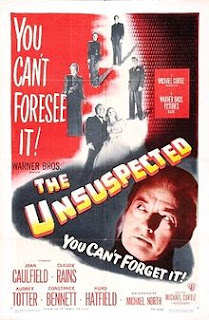With his distinctive English voice and intensely intelligent manner, Claude Rains made himself at home in a wide variety of memorable roles, although he was more often the heavy or a supporting character instead of a leading man. Born in London in 1889, the actor grew up in the English theater scene but made an indelible mark with his first big film role as the unseen protagonist of James Whale's horror classic, The Invisible Man (1933). He would go on to be nominated for four Academy Awards for Best Actor in a Supporting Role, and even though he never took an Oscar home he became one of classic Hollywood's iconic stars. Rains didn't always play villains, but his dark characters are delightfully complicated, so my list here compiles five of my favorite Rains rascals, each a slippery cinematic sinner worthy of your time.
The Invisible Man (1933)
It's no surprise that Rains would become a favorite Hollywood heavy after his breakthrough performance in this Universal horror adaptation of the novel by H.G. Wells. Completely unseen except for the last shot of the picture, Rains nevertheless triumphs as the increasingly insane Dr. Jack Griffin, who uses himself as a test subject for his invisibility formula. Even more than his other horror films for Universal, The Invisible Man lets director James Whale indulge his very dark sense of humor, and Rains goes over the top with Griffin's murderous, mad antics.
The Adventures of Robin Hood (1938)
Rains is just one of many great stars packing into Sherwood Forest for this glorious Technicolor adventure, but his Prince John is a villain you'll love to hate. Sadistic, petty, and vain, the prince usurps the English throne in the absence of his brother, King Richard (Ian Hunter), only to be plagued by the rebellious Robin (Errol Flynn) and his merry band. Fans of the Disney version from the 1973 animated Robin Hood will enjoy comparing the vocal performance of Peter Ustinov with Rains' live action incarnation.
Mr. Smith Goes to Washington (1939)
Director Frank Capra spins a story of political idealism clashing with corruption and cynical power in this beloved picture. James Stewart stars as naive newcomer Jefferson Smith, who is suddenly thrust into the machinations of the US Senate. Rains plays Joseph Paine, the senior Senator who is Stewart's hero and mentor, but he turns out to be far less noble than Jefferson originally believes. Paine is one of Rains' more realistic antagonists, not so much outright evil as self-interested and jaded, but Rains gives a terrific performance in the role and earned his first nomination for Best Supporting Actor as a result.
Notorious (1946)
Rains gets to be a subtler, more devious sort of villain in this Hitchcock thriller, but he's still delightfully bad as the Nazi Ingrid Bergman is asked to spy on by the US government. Rains' character, Alexander Sebastian, marries Alicia (Bergman) but is also willing to murder her in order to protect himself and his secrets. His duplicitous nature gives Rains plenty of opportunities to be both charming and chilling, especially in scenes with Alexander's sinister mother (Leopoldine Konstantin). The role earned Rains his final Oscar nomination for Best Supporting Actor.
The Unsuspected (1947)
This noir mystery from director Michael Curtiz is another role that makes great use of Rains' fantastic voice by casting him as the popular host of a radio mystery show. Unfortunately, Rains' suave radio star, Victor Grandison, goes from just talking about murder to actually committing it. Rains has a much more central role in this picture as the "unsuspected" murderer of the title, but it's pretty obvious from the beginning, in spite of the title, that Victor is up to no good. The movie also stars Joan Caulfield, Audrey Totter, Constance Bennett, and Hurd Hatfield.
For more of the darker side of Claude Rains, see Kings Row (1942), Phantom of the Opera (1943), and Angel on My Shoulder (1946). Get a sense of his range with The Wolf Man (1941), Casablanca (1942), Mr. Skeffington (1944), and Caesar and Cleopatra (1945). Rains made his final screen appearance as one of the greatest villains of human history, King Herod the Great, in The Greatest Story Ever Told (1965).


